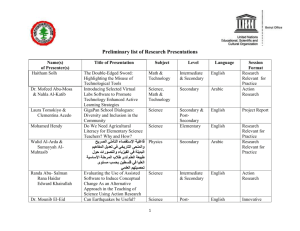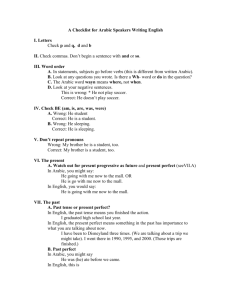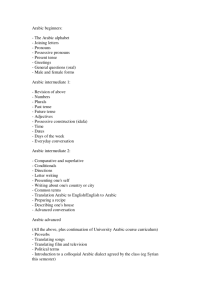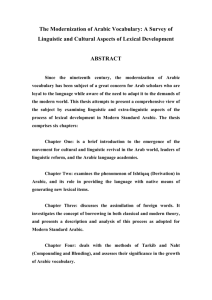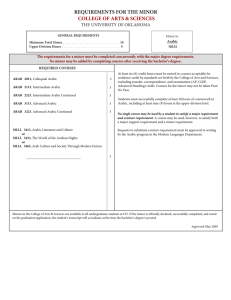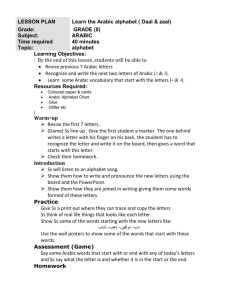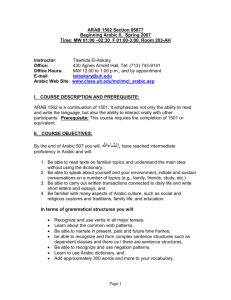here - West Ada School District
advertisement
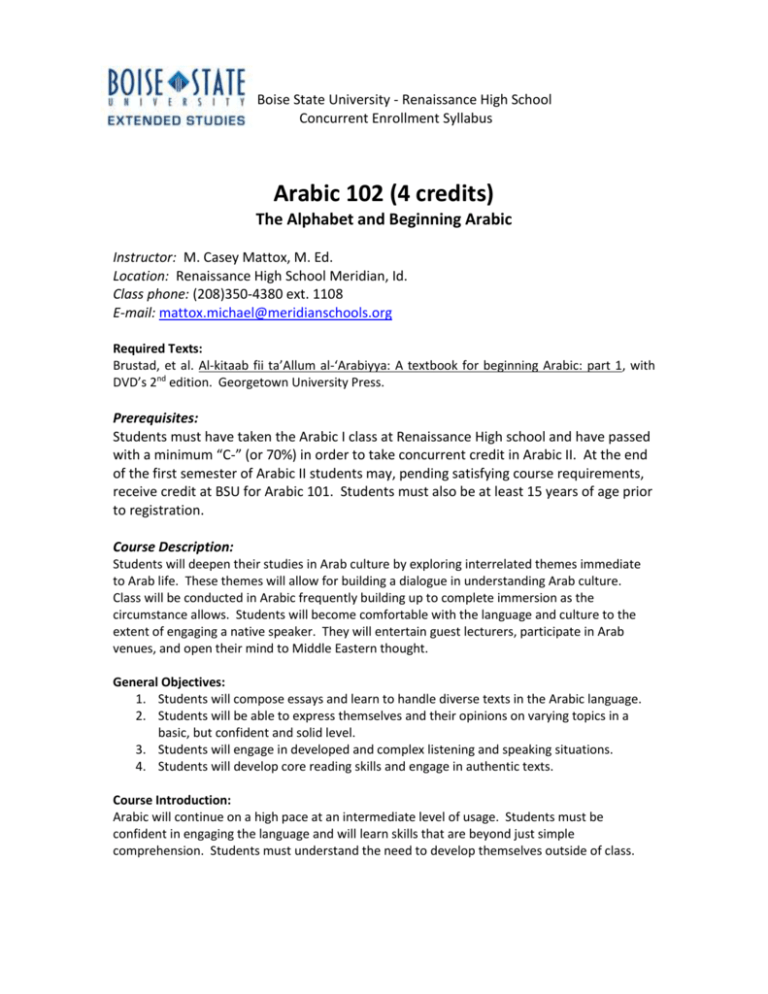
Boise State University - Renaissance High School Concurrent Enrollment Syllabus Arabic 102 (4 credits) The Alphabet and Beginning Arabic Instructor: M. Casey Mattox, M. Ed. Location: Renaissance High School Meridian, Id. Class phone: (208)350-4380 ext. 1108 E-mail: mattox.michael@meridianschools.org Required Texts: Brustad, et al. Al-kitaab fii ta’Allum al-‘Arabiyya: A textbook for beginning Arabic: part 1, with DVD’s 2nd edition. Georgetown University Press. Prerequisites: Students must have taken the Arabic I class at Renaissance High school and have passed with a minimum “C-” (or 70%) in order to take concurrent credit in Arabic II. At the end of the first semester of Arabic II students may, pending satisfying course requirements, receive credit at BSU for Arabic 101. Students must also be at least 15 years of age prior to registration. Course Description: Students will deepen their studies in Arab culture by exploring interrelated themes immediate to Arab life. These themes will allow for building a dialogue in understanding Arab culture. Class will be conducted in Arabic frequently building up to complete immersion as the circumstance allows. Students will become comfortable with the language and culture to the extent of engaging a native speaker. They will entertain guest lecturers, participate in Arab venues, and open their mind to Middle Eastern thought. General Objectives: 1. Students will compose essays and learn to handle diverse texts in the Arabic language. 2. Students will be able to express themselves and their opinions on varying topics in a basic, but confident and solid level. 3. Students will engage in developed and complex listening and speaking situations. 4. Students will develop core reading skills and engage in authentic texts. Course Introduction: Arabic will continue on a high pace at an intermediate level of usage. Students must be confident in engaging the language and will learn skills that are beyond just simple comprehension. Students must understand the need to develop themselves outside of class. Instructional Strategies: Due to the nature of learning a foreign language Direct Instruction will be the primary method for learning new vocabulary. Some other methods for learning will be used where possible are: Socratic Methods Discussion/ questioning Problem solving Presentation to class Cooperative learning Games/Competitions Whiteboards Internet Homework Journaling Skype Internationally Typing Google Earth Grades: Note: Failing to do an assignment in Arabic will prove to hinder your performance in the course almost immediately due to the uniqueness of the course itself unlike many other languages and classes. 1. Language production: All graded assignments may include one or all parts of the language production component. I.e. a project may be graded on speaking and listening or writing and reading, etc. Ex. There is no overall score for just the category of “projects.” This will focus you to the skill needed to be acquired and not the points. You may get an “A” on speaking but and “F” on listening for one assignment. So your effort to develop these skills in every task determines your grade. 2. Homework and class work is not included as a part of your final grade but is built in to quizzes directly. I.e. Those works will not be entered into the grade book. However we will always grade them in class for your feedback. The success to which you do in your homework will be seen in your quizzes as they are based on homework and class work. 3. Class participation: The easiest road to success in a foreign language is to participate. If you speak the language, you will speak the language. If you don’t speak the language, you won’t speak the language. Like a film, language is a product and you are the producer. 4. Renaissance High school policy requires all assignments to be completed by its due date. Excessive failure to complete any assignment requires parental involvement to ensure its completion if necessary. 5. There will also be a semester and End of Course (EOC Exam). Evaluation: Grades Language Production* EOC/Semester Exams Quizzes Assignments/Homework Final Grade Scale: A = 90% – 100% B = 80% – 89% C = 70% – 79% D = 60% – 69% F = 0% – 59% 70% 10% 20% 0% *Language Production: Speaking: 30% Listening: 10% Reading: 10% Writing: 20% Calendar Year: September 2014-May 2015 *these dates are subject to change during the semester at the discretion of the instructor* Subjects/Text Chapters August/September: Al-Kitaab Ch. 1-7 Food: From buying to eating Last of September/October: Al-Kitaab Ch. 8 Weddings and dating Extra curricular activities Relationships Courtship November: Al-Kitaab Ch. 9 Daily schedules Clubs Art and Music Colors December: Al-Kitaab Ch. 10 Islam, Christianity, and Judaism January: Al-Kitaab Ch. 8-10 review Miscellaneous February: Al-Kitaab Ch. 11 Travel and Places of Interest There and Back Again Tourism March: Al-Kitaab Ch. 12 Early Historical Events Rise and Spread of Islam Christian/Muslim Relations in the Middle East Crusades and Salah Al-Din Movie: Al-Nasr Salah Al-Din April: Al-Kitaab Ch. 13 Government and Law Courts Provinces Governing Bodies Political Terms: Democracy, communism, etc. Elections May: Al-Kitaab Ch. 14 The City The House/Apartment Using the Dictionary Grammar Review Ch. 1-7 Past Tense Negation Roots and Patters in Verbs Counting 100-111 Negating nouns Time Ordinal numbers Present tense moods Prepositions Object Pronouns Review Ch. 8-10 Present Nominative Tense Adjectival sentences Quantifiers Review the superlative/comparative Future tense Subject Verb Agreement Negating the Future Prepositions Continuance End of Year Review Place Descriptions Definite and Indefinite Verb Patterns (intro.) Learning Outcomes for the beginning language series (101-102) The elementary and intermediate language series (101-202) offered by the Department of Modern Languages and Literatures currently fulfills Area I Core requirements in the Arts & Humanities, specifically as they relate to the Learning Outcomes of the Core Curriculum as listed in the BSU catalog under Communication Skills Cultural Perspective. Students who complete an elementary language course with a high level of achievement will be able to: Communication Skills Read, interpret, analyze, and evaluate written discourse in the target language at the elementary level; Write clearly and appropriately in the target language for a variety of purposes and for different audiences at the elementary level; Employ speaking, listening, and interpersonal skills appropriate to various rhetorical situations in the target language at the elementary level; Interpret, analyze and evaluate spoken and written discourse in the target language at the elementary level; Identify and make appropriate use of information sources in both written and spoken discourse in the target language at the elementary level; Negotiate meaning in a variety of situations and contexts appropriate to the stage of elementary language acquisition; Cultural Perspective Explain their own cultural perspective and make meaningful comparisons between it and other cultural perspectives. Philosophy of the Diversity Requirement Boise State University values cultural diversity in its faculty, its students and its curriculum. Because we live in a multicultural world, we seek to educate students to recognize and appreciate the many ways in which each of us is shaped by gender, sexual orientation, class, race, culture, ability, nationality, religion, and ethnicity. This requires more than just exposure to cultural differences; it requires that we critically examine such differences being attentive to the special challenges that each of us faces in understanding those whose lives are shaped by cultures other than our own. It is hoped that such reflection will afford each of us a critical perspective of the cultures with which we are most familiar and help us appreciate the elements common to human beings across cultures. Courses that fulfill Boise State University’s Diversity Requirement will serve as a foundation for ongoing exploration of difference. Accordingly, such courses will 1) be concerned with issues and/or theories of gender, sexual orientation, class, race, culture, nationality, ability, religion or ethnicity as these may be found anywhere in the world; and 2) require reflection on the challenges and benefits of dialogue across differences. Learning Outcomes of the Diversity Requirement Knowledge Content: The course will increase the student’s knowledge and awareness of the unique contributions of diverse groups and their beliefs, values, knowledge, and experiences of people of diverse groups. Self-reflection: The course will require students to gain self-awareness of and insight into their cultural perspectives. Diversity Skills: The course will develop students’ abilities to sensitively work with diverse individuals and groups while building diverse relationships. Academic Policies: 1. Disabilities and Special Needs: Accommodations will be provided for those of specific needs to better facilitate learning. These needs are to be mandated through the school counselor and administration. This information will be held confidential. 2. Late Work: Any assignment that is not accounted for by the collection time is considered late work and will automatically be assessed a 30% reduction in the grade. (I.e. If the student gets a perfect score after it is late he/she will only receive a 70%). If students have a legitimate reason why they cannot take the exam, quiz or essay, please discuss this with the instructor one day beforehand. All assignments will be taken until the last week before the quarter ends. Quizzes are given one week to redo until the grade achieved becomes final. Student Code of Conduct Please note that high school students enrolled in concurrent credit classes are held to the same student standards found in the Boise State University Student Code of Conduct, at http://www.boisestate.edu/osrr/. Definitions of cheating, plagiarism and other forms of academic dishonesty as well as policies and procedures for handling such cases can be found at this web site.


